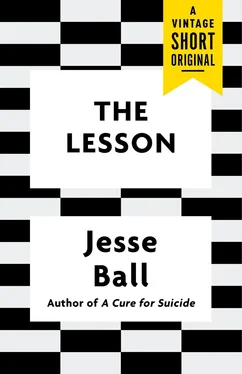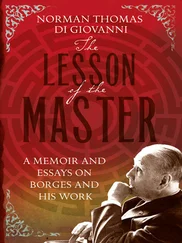Jesse Ball is the author of five previous novels, including A Cure for Suicide, Silence Once Begun, and Samedi the Deafness , and several works of verse, bestiaries, and sketchbooks. He was named a finalist for the 2015 New York Public Library Young Lions Fiction Award and a 2014 Los Angeles Times Book Prize. Ball received an NEA creative writing fellowship for 2014 and the 2008 Paris Review Plimpton Prize for Fiction, and his verse has been included in the Best American Poetry series. He gives classes on general practice in the School of the Art Institute of Chicago’s Master of Fine Arts Writing program.
On that clear and fortunate morning, Ezra Wesley woke with the special gladness of a person who will die within the month. He did not know that he had this gladness, for, of course, the one who has it never knows its source. One mustn’t know — otherwise, one most certainly would not be glad! However that may be, glad he was. His wife, Loring, was watching him. She said nothing. Could she tell how glad he was? She was a very observant person.
They had lived together, after all, for forty-five years, and she knew his habits. Could she tell that this was the special happiness of one who will soon be departing? She could not.
But as I said, it was morning, and the sun had risen. So, soon they were walking out by the canal that ran beside their home, walking down into the near district of the town where a fine place was and breakfast might be found. They sat there, this old woman, this old man, and ate something, and had this conversation:
— There is a little box by the window of the room upstairs, the room we never use.
— I know the box you mean. It is the box that I once tried to open and you said,
— I said, do not open that box until I have been dead three months.
— You did, she said. You said that.
— Well, now I am thinking, said he. I am thinking that three months was not the right measure. I believe one year to the day.
— I will keep that in mind, she said. If you die. Of course, if I die first, you and your little box won’t do anyone much good.
— That much is true, Loring. I suppose that much is true.
He complained of a cough. The cough was not a bad one. To listen to him cough, well — it didn’t distress one, as the hearing of some coughs do. Yet, as the days passed, the cough grew worse. Oddly enough, the joy that he felt seemed to intensify, so that the cough was accompanied by a nature gladder and gladder.
And so things continued. Their life was a simple one. He had been a great chess player. They had both been famous masters, he and she, and both had played in major tournaments in their time. He had been a champion for a period of years. They were not forgotten, not even then, so long after, and would occasionally be visited by old friends, or young people, curious about their accomplishments. As well, they still took students, although at present there were none. Yet, on the street by their door, hung a little sign. Chess lessons by appointment. Inquire within.
Loring finally went for the doctor when three weeks had passed. There was a red figure of a woodsman in the study. She had been staring at it for at least an hour, trying to decide if she should go. The window was open, and a gust blew such that the figure tipped. This was not uncommon, and, in fact, they had often joked about the woodsman’s sure-footed nature. Yet this time, she took it for a sign, and went immediately for the doctor.
He came quickly, being that the Wesleys were somewhat important in the town, or perhaps it was simply his way, to come quickly when called. Perhaps he was an old family friend. Who can say? In any case, there he was, and he examined Ezra, and found that he was very ill indeed. The manner of his illness was a subtle one. He had perhaps been ill for years. Would it have been good to know of the illness? Loring asked. Could it have been averted? No, no. The illness is incurable. It is best not to know. What has happened so far, in some sense, is for the best. Loring was crying, and Ezra was holding the quilt that was over his knees. The woodsman remained toppled, although that, in and of itself, was meaningless.
This continued through the next days: Loring would cry. Ezra would sit quietly, or console her. In truth, the joy that had grasped him at first had simply grown and grown. He felt very keenly the pleasure of life, and told her that she must under no circumstance cry. He kissed her and they went again on walks by the canal. The cough faded and was gone. A beautiful weather descended on the town. Such a fall…those who lived through it remember it always. They were as they had been when they had met, this old couple, feeling on the verge of discovery. Each represented to the other all that was new and unknown about life, all that had been promised.
On the thirtieth day, Loring woke and Ezra did not. His eyes were shut, and his hands were at his side. He had gone to sleep with his clothes on, like some pharaoh. Somehow, Loring had not noticed.
Although it may seem to those of you who have only heard of such things that it would be strange to sit for a long while in a room with a dead person, it is quite common, I must tell you. If the person is dead, then there is no particular reason to call anyone. And besides, one feels in some way that nothing matters at all, and that any action is as good as any other. Then, to simply sit and look again and again upon the countenance of the one who died, it is what passes. And in this way it is not really an uninterrupted staring. It is a series of glances, each one as full of surprise as when one hears a noise and turns. One is expecting something, and can’t say what — yet when one sees it, one knows what one knew, what one knew and couldn’t say. It is this way with death. It is in our nature to feel the extent of it when we face it, and to have it fall away the moment we turn.
And so she went on there in the bedroom, looking at her husband, and looking away, looking at him and looking away, and wondering what was left, and why.
But of what we are capable, we seldom know. Friends came and the matter was arranged. The day was set for a funeral, and although Ezra had in his possession better clothes, Loring insisted he be buried in the clothes he had worn. For who better to clothe one for death than one’s own hand, galvanized by an originless joy?
He was buried on the top of a hill in a cemetery in that town. There had been talk of removing him to a far city, the place of his birth, where his chess playing was perhaps best remembered. Yet Loring had made her wish known, that he should lie in the nearest cemetery, and that is what they did.
A file of black-clad men and women, on a rainy morning, threading their way up a hill, to where a grave had been dug. His body was put in, and then everyone was gone away.
To Loring it seemed that suddenly everyone was gone away. It was a week later. It was month later. She found herself again and again there by the grave, and it was as though the funeral had just ended, and yet no one was there. His death was still so fresh that she could remember how they had been standing by the bedroom door, and he had observed the way the floor was uneven. The bed, he had said, is uneven because the floor is uneven. And she had said, perhaps the whole house is uneven. And he had said, unsmiling, do not blame the house. It is a good house. He had never been one to smile when laughing. And then they had gone to sleep.
Читать дальше












